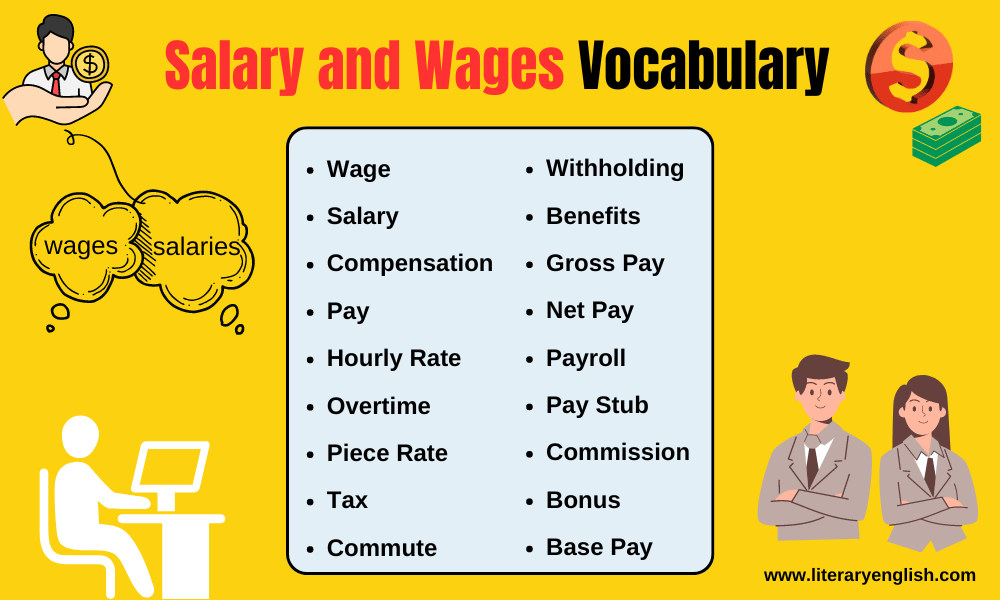Payments made to employees for their work, where wages are typically hourly and salaries are fixed annual sums. They form the primary income for most workers. In this article, we are going to learn about important vocabulary words related to wages and salaries. You will understand terms like wage, salary, and compensation, which help explain how we get paid for our work. Employers use these words to set and manage pay, and employees need to know them to understand their earnings. Let’s dive in and explore these terms together to make sure everyone knows what they mean and how to use them.
Wage
Payment for labor, usually calculated on an hourly or daily basis. It’s common for jobs like retail or manufacturing.
Uses
- “He earns a wage of $15 per hour at the factory.”
- “You should discuss your wage during the job interview.”
Salary
A fixed regular payment, often expressed as an annual sum, given to employees regardless of hours worked. Common in professional jobs.
Uses
- “She receives an annual salary of $60,000.”
- “Your salary will be reviewed annually based on performance.”
Compensation
The total payment and benefits provided to an employee for their work. It includes wages, salaries, and other benefits.
Uses
- “The compensation package includes health insurance and a retirement plan.”
- “He negotiated a higher compensation during his job offer.”
Pay
General term for money received by employees for their work. It can refer to wages, salaries, or any other form of earnings.
Uses
- “Her pay was deposited directly into her bank account.”
- “You should ensure your pay reflects the work you do.”
Hourly Rate
The amount of money paid for each hour of work. Common in parttime and contract jobs.
Uses
- “His hourly rate is $20 for tutoring services.”
- “You need to know your hourly rate before accepting the job.”
Overtime
Time worked beyond the standard hours, usually paid at a higher rate. Often applicable in hourly wage jobs.
Uses
- “She earns overtime for any hours worked over 40 per week.”
- “You will get overtime pay if you work extra hours.”
Piece Rate
Payment based on the number of items produced or tasks completed. Common in manufacturing and agricultural jobs.
Uses
- “He gets paid a piece rate for every garment he sews.”
- “You can earn more by increasing your piece rate output.”
Commission
Earnings based on a percentage of sales made or business generated. Often used in sales jobs.
Uses
- “She earns a commission on every house she sells.”
- “Your commission will depend on your sales performance.”
Bonus
Additional compensation given for performance beyond normal expectations or as an incentive. It can be annual or projectbased.
Uses
- “He received a yearend bonus for his hard work.”
- “You might get a bonus if the project is completed early.”
Base Pay
The initial rate of compensation, excluding extra lump sums received for bonuses, overtime, or benefits. It’s the fixed part of the salary.
Uses
- “Her base pay is $50,000 per year.”
- “You should know your base pay before considering bonuses.”
Tax
Compulsory financial charge imposed by the government on income, sales, or activities. It’s deducted from earnings.
Uses
- “He needs to pay income tax on his salary.”
- “You should calculate your tax liabilities accurately.”
Withholding
The portion of an employee’s wages withheld by the employer and sent directly to the government as partial payment of income tax. It’s shown on the pay stub.
Uses
- “Her paycheck shows the amount withheld for taxes.”
- “You should check your withholding to avoid a big tax bill.”
Benefits
Nonwage compensation provided to employees, which may include health insurance, retirement plans, and paid time off. They are part of the overall compensation.
Uses
- “His job offers great benefits like health insurance and paid leave.”
- “You should consider the benefits when choosing a job offer.”
Gross Pay
The total amount of money earned before any deductions are made. It’s the full earnings from work.
Uses
- “Her gross pay for the month is $4,000.”
- “You need to know your gross pay before deductions.”
Net Pay
The amount of money received by an employee after deductions, often referred to as “takehome pay.” It’s the actual earnings.
Uses
- “His net pay is less due to taxes and deductions.”
- “You will see your net pay on your pay stub.”
Payroll
The total amount of wages and salaries paid by a company to its employees. It includes all compensation and is managed by the payroll department.
Uses
- “The payroll is processed every two weeks.”
- “You need to submit your hours for the payroll to be accurate.”
Pay Stub
A document provided to an employee with each paycheck, detailing earnings and deductions. It’s proof of payment.
Uses
- “She checked her pay stub to verify her deductions.”
- “You should keep your pay stub for your records.”
Conclusion
Understanding these vocabulary words about wages and salaries is important for everyone. You need to know these terms to understand your pay and benefits. Employers use them to manage payroll and set fair pay. I use these words to explain job offers and paychecks. Everyone in the workforce should learn this vocabulary to handle their jobs and money better.
